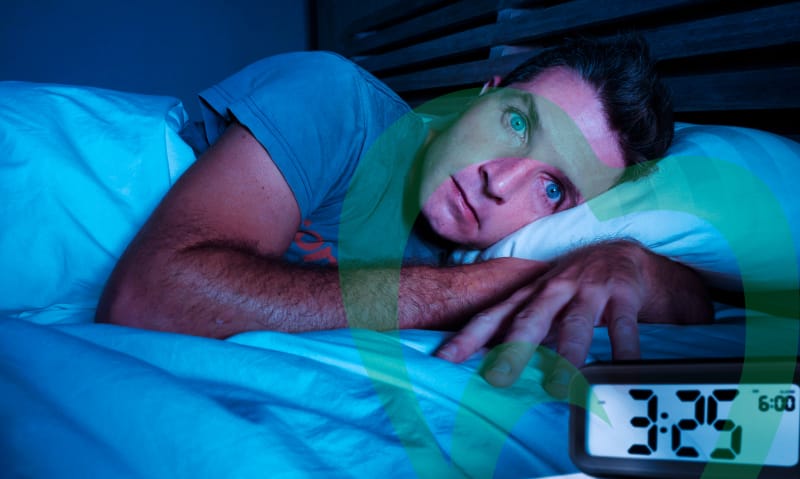Does Sleep-Disordered Breathing Affect Mental Health? It Could—More Than You Think

The Surprising Link Between Sleep-Disordered Breathing and Mental Health
According to the Cleveland Clinic, more than 50 million Americans suffer from some sort of sleep disorder, and more than 100 million Americans say they don’t get enough sleep. A lack of quality sleep can affect not only your mind but also your body. If you think your lack of sleep could have something to do with your mental health and current mood, you may be right. Read on to learn more about how these two seemingly unrelated topics are connected, and talk to your dentist or doctor to discuss the next step toward receiving a formal diagnosis.
What is sleep-disordered breathing?
Sleep-disordered breathing is an issue that causes a person to stop breathing momentarily while they are sleeping. During one of these episodes, the airway tissues relax, which leads to either a partial or complete obstruction of the airway. Snoring is the most common side effect of sleep-disordered breathing. Obstructive sleep apnea is a common sleep-disordered breathing condition. Many people who are diagnosed with sleep apnea report being tired after getting an entire night of rest. The constant starting and stopping of their breathing due to the restrictive airway can cause a person to not sleep fully. Some people will jolt awake when this takes place, but others may only stir briefly and not realize they are waking so often.
How do I know if I am suffering from sleep apnea?
Snoring could definitely be a sign of sleep apnea since it happens when the airway gets blocked, at least partially. If you still feel tired when you wake up in the morning after what you thought was a restful night of sleep, you should get an evaluation for sleep apnea. Other symptoms of sleep apnea include daytime drowsiness, nighttime wakings (often due to gasping or choking), and morning headaches. Appetite changes and newly diagnosed health conditions could also be related to sleep apnea.
What happens to the body during a sleep apnea episode?
As described above, sleep apnea is an effect of the airway being restricted during sleep. People who are overweight tend to have a higher risk of sleep apnea, and it tends to be more common in men than it is in women.
During a sleep apnea episode, the oxygen levels drop due to the blocked airway, which can cause a dramatic drop in oxygen. Your brain senses that your body is not breathing correctly and attempts to wake you up as a reminder to breathe. Because these frequent wakings are typically brief, many people do not remember they even occur. Those who suffer from sleep apnea may experience these micro awakenings hundreds of times per night, which affects the depth and quality of what sleep they are getting. These patients will wake up thinking they got a full night’s rest yet still feel tired.
But how does this affect my mental health?
Another thing that happens during a sleep apnea episode—that people often aren’t aware of—is how a dip in oxygen can affect the nervous system. When your body senses your oxygen level dropping, it triggers the sympathetic nervous system and produces extra adrenaline, cortisol, and aldosterone, which can, in turn, raise your blood pressure and heart rate. This can also keep your body from relaxing completely so that you can sleep well through the night.
Since your body is in a constant state of stress from the lack of oxygen and higher fight-or-flight hormones, your body has a difficult time self-regulating. In fact, you might find that the chronic lack of sleep you are experiencing can lead to feelings of anxiety, depression, and even mood swings throughout the day. That is why it is so important to discuss your symptoms with your doctor or dental professional so that you can work toward a diagnosis.
How does sleep apnea treatment affect depression and anxiety?
A study by Stanford University suggests that people who are depressed are five times more likely to suffer from sleep apnea than those who aren’t suffering from depression or anxiety. Scientists believe the lack of sleep may play a role in a person feeling anxious or depressed. Several studies have found that patients who receive treatment for sleep apnea often experience relief from feelings of depression and anxiety. These results point to a complete and restful night of sleep as being an important factor in a person’s well-being.
How can The Tooth Doc help me with my sleep apnea?
First and foremost, the team at The Tooth Doc will be able to pick up on common symptoms of sleep apnea after a consultation. One of the treatment options The Tooth Doc can offer once you’ve been officially diagnosed is a custom-made oral appliance. The purpose of the appliance is to help hold the tongue in place and keep the airway open for unobstructed breathing during the night. These are particularly useful for patients who cannot tolerate (or choose not to tolerate) a CPAP machine, a treatment that helps to keep the airway open during sleep through continuous positive airway pressure.
The Tooth Doc can also help you out with other dental problems that could be connected to sleep apnea. Did you know that sleep bruxism, or teeth grinding, is common in sleep apnea patients? Acid reflux can also be a surprising effect of sleep apnea. Both symptoms can wear down the enamel, the hard outer layer of the teeth. Teeth with compromised enamel are more prone to cavities and fractures.
The important thing to realize is that sleep apnea doesn’t have to be a permanent disruptor of your sleep and your mental health. A formal sleep apnea diagnosis will enable your dentist to plan and recommend an appropriate treatment to help regulate your breathing and get you back to a full eight hours of sleep. Contact the team at The Tooth Doc to get to the bottom of your sleep apnea.